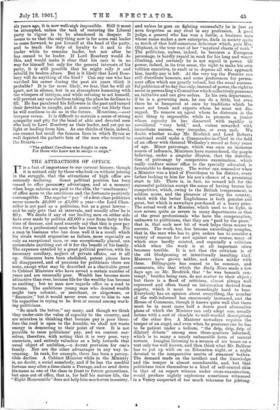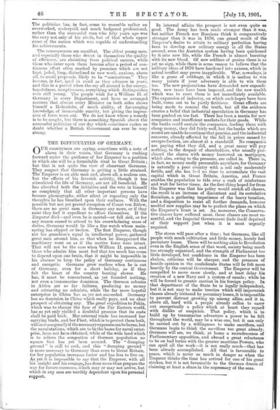THE ATTRACTIONS OF OFFICE.
IT is a fact of importance to our current history, though it is noticed. only by those who look on without joining in the struggle, that the attractions of high office are seriously declining. Great political position has long ceased to offer ioecuniacry advantages, and at a moment when huge salaries are paid to the able, the "emoluments" of office seem to the ambitious and the fortunate positively contemptible. The regular " pay " of a first-class politician never exceeds £6,000 or £5,000 a year—the Lord Chan- cellor is not paid as a politician, but as a great lawyer and he only gets that at intervals, and usually after he is fifty. We doubt if any of our leading men on either side have ever made by politics £2,000 a year from forty to the - time of decease, and need scarcely say that this is poor pay even for a professional man who has risen to the top. For a man in business who has done well it is a result which his rivals would stigmatise as failure, more especially as only an exceptional man, or one exceptionally placed, can accumulate anything out of it for the benefit of his family. The expenses entailed by a great political position, with its necessary corollary, neglect of private affairs, eat it all up. Sinecures have been abolished, patent places have • all ,disappeared, and of pensions for politicians there are none, except what may be described as a charitable grant to Cabinet Ministers who have served a certain number of years and are unusually poor. Wealth has become more attractive than ever, because life for the wealthy has become so exciting ; but no man now regards office as a road to fortune. The ambitious young man who desired wealth might turn colonist, or merchant, or shipowner, or "financier," but it would never even occur to him to use his capacities in trying to be first or second among work- ing politicians.
"So much the better," say many, and though we think they under-rate the value of capacity to the country, and are mistaken in thinking that because pay is poor there- fore the road is open to the humble, we shall not waste energy in demurring to their point of view. It is not possible to raise politicians' pay, and we content our- selves, therefore, with noting that it is very poor, very uncertain, and entirely valueless as a help towards that usual object of ambition,-6, decent provision for one's family. Nor are the other advantages in any way in- creasing. In rank, for example, there has been a percep- tible decline. A Cabinet Minister while in the Ministry is, no doubt, a social somebody, and if he has the needful fortune may after a time claim a Peerage, and so send down his name as one of the class in front to future generations, but once out of office, that is, for half his mature life, the ":Right Honourable " does not help him much even in society, and unless he goes on fighting successfully he is just as soon forgotten as any rival in any profession. A good judge, a general who has won a battle, a business man whose name makes a new enterprise, finds in society quite as much of that half-conscious deference which, pace Mrs. Oliphant, is the true root of her "mystical charm of rank." The politician, unless, indeed, he becomes a European personage, is hardly repaid in rank for his long and weary climbing, and certainly he is not repaid in power. Of power, indeed, in its true sense, the right to make his own volition executive, to exalt or to depress all who approach him, hardly any is left. At the very top the Premier can still distribute honours, and some preferences for perma- nent office which are greatly valued, but the usual success- ful politician of to-day has only, instead of power, the rightto assist in persuading a Committee which collectively possesses an initiative and can give orders. In his own department, if he is a governing man, he can do a little, but even there he is hampered at once by traditions which he must not break and. experts whom he must not dis- regard. To remove an agent whom he distrusts is the next thing to impossible, while to promote a junior whose capacity he has discerned with rapidity is considered "very bold," and, unless rewarded with immediate success, very irregular, or even rash. We doubt whether to-day Mr. Brodrick and Lord Roberts combined could make a Commander-in-Chief in the field of an officer with General Wellesley's record at forty years of age. Minor patronage, which was once an immense source of influence, Ministers have surrendered, the people believing, under a singular illusion, that the distribu- tion of patronage by competitive examination, which really confines minor office to the specially educated,. is favourable to democracy. The writer can remember when a Minister was a kind of Providence to his district, every father looking to him for his son's elinnce of a promising start in life. There is, in fact, no reward left for the successful politician except the sense of having beaten his competitors, which, owing to the British temperament, is seldom acute, and the pleasure of serving his country, which with the better Englishman is both genuine and great, but which is nowadays purchased at a heavy price. The actual work of a Minister, which used to be light, is now severe, quite as severe in many departments as that of the great professionals who have the compensation, unknown to politicians, that they are " paid by the piece," that is, that each new bit of work helps them nearer to success. The work, too, has become exceedingly complex, that is, the man who has to give orders has to consider, a variety of reasons for and against any course, many of which once hardly existed, and especially a criticism which when the work is at all important often becomes terrible. It is not that the criticism is of the old bludgeoning or intentionally insulting kind. Manners have grown milder, and critics milder with them. . Billingsgate has ceased to be common, and comments, like that which the Daily News made a few days ago on Mr. Brodrick, that "he was beneath con- tempt," besides being rare, do not matter to their object ; but there is a, flood of criticism, almost always well expressed and often based on information derived from experts, which it must be exceedingly hard_ to bear. Everybody has an opinion about everything, the number of the well-informed has enormously increased, and the House of Commons, though it knows quite well that there must be in most cases half a dozen good alternative plans of which the Minister can only adopt one, usually listens with a sort of chuckle to well-worded descriptions of the other five. A Minister nowadays requires the temper of an angel, and even when he possesses one he has to be patient under a tedium, "the drip, drip, drip of dilatory debate" among men three-quarters informed, which is to many a nearly unbearable form of mental torture. Imagine listening to a sermon of six hours on a text only too well k-nown, and then think what Mr. Balfour has to put up with on an Education night, or a night devoted to the comparative merits of steamers' boilers. The demand made on the intellect and the knowledge and the temper is almost unendurable, and, but that politicians train themselves to a kind of self-control akin to that of an expert witness under cross-examination, would produce nightly explosions sometimes witnessed in a Vestry suspected of too much tolerance for jobbing. The politician has, in fact, come to resemble rather an overworked, underpaid, and much badgered professional, rather than the successful man who fifty years ago was the envy not only of his rivals, but of that whole upper crust of the nation which was capable of understanding his achievements.
The consequences are manifest. The ablest young men, and especially those who detect in themselves the quality of efficiency, are shrinking from political careers, while those who enter upon them become after a period of con- tinuous effort often marked by promises which are not kept, jaded, limp, disinclined to new work, anxious, above all, to avoid proposals likely to be "contentious." They become, in fact, aged in mind as they advance in years, and this in a period when the cry all around is for energy, hopefulness, receptiveness, everything which distinguishes men still young. The people wish for a William II. of Germany in every Department, and have so arranged matters that almost every Minister on both sides shows himself a Hohenlohe, of much ability, of far-ranging knowledge, of immovable suavity, but giving the impres- sion of force worn out. We do not know where a remedy is to be sought, but there is something Spanish about the successful politician of our day which sometimes makes us doubt whether a British Government can ever be very strong.







































 Previous page
Previous page